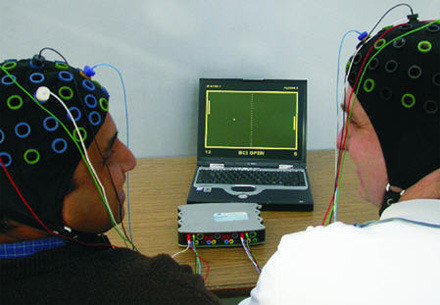A brain computer interface (BCI) is an external devices that communicate directly to the brain of humans or animals through neuron silicon interfaces. These external devices can either transmit or receive signals to and from the brain which can then be used to restore function or movement to sensory organs or limbs. Furthermore, these external devices can range from simple circuits to advanced silicon chips.
As of today, brain computer interface devices have been successful in restoring damaged sight, movement and hearing. The success of these devices stems from the fact that the brain is able to adapt to brain computer interfaces and treats implant-controlled prosthesis as natural limbs. With the new technologies, it is even possible to augment human capacity in the near future.
Neuroprosthetics
One of the applications of brain computer interface technology is neuroprosthetics. This field of neuroscience deals with devices that are used to replace functions of impaired or damaged sensory organs or nervous systems. One of the most popular of these devices is the cochlear implant used in almost a hundred thousand patients to date.
Types of Brain Computer Interface
Invasive Brain Computer Interfaces
Invasive Brain Computer Interface Devices are those implanted directly into the brain and has the highest quality signals. These devices are used to provide functionality to paralyzed people. Invasive BCIs can also be used to restore vision by connecting the brain with external cameras and to restore the use of limbs by using brain controlled robotic arms and legs.
The problem with this type of device though, is that scar tissue forms over the device as a reaction to the foreign matter. This reduces its efficiency and increases the risk to the patient.
Partially Invasive Brain Computer Interfaces
Partially Invasive BCIs, on the other hand, are implanted inside the skull but outside the brain. Although signal strength using this type of BCI device is a bit weaker, partially invasive BCIs has less risk of scar tissue formation.
Non Invasive Brain Computer Interfaces
Non invasive brain computer interface, although it has the least signal clarity when it comes to communicating with the brain (skull distorts signal), is also the safest. This type of device has been found to be successful in giving a patient the ability to move muscle implants and restore partial movement. One of the most popular devices under this category is the EEG or electroencephalography capable of providing a fine temporal resolution. It is easy to use, relatively cheap and portable.
Ethics and BCIs
Of course, the use of BCIs has sparked some debate among people especially since one of its future applications is the enhancement of human capabilities and mind control (brain pacemakers are now successful in treating depression). Nonetheless, this technology has not yet attained its full maturity and is therefore still relatively below the social radar. As of today, this technology is seen more to help much in fighting against disability through prosthetics and as a treatment for neurological ailments such as depression.




Brendan Allison
This an inaccurate definition of BCIs. We have several papers, textbooks, etc defining BCIs as devices that read from – not write to – the brain. See, for example, Wolpaw and Wolpaw 2012 or Nam et al 2018.
Victum
They have gone wirless with the FT-1500M
VHF FM Mobile Transceiver and with regoc. technology, you won’t even know your hooked up to the machine until they decide to let you know, via pain or audio sounds. They are generations ahead of what you think. Thompson Julie Cardoso has one at the moment and is trying to use it to coherse people to commit suicide by her BCI machine. Two if her x roomates commited suicide. THey have complete control over what ever they want you to see, they can see into your dreams by simple watching your dreams.
Diana o
brain chips are evil and control your nerves it is an evil invention made up by evil men you should not in any way get a brain chip they can do more than you think and in the wrong hands of government used by them to do what they want and make people believe what they want with the person with the chip they minipulate your mind and make what not is your sound like it is they have not right to implant things in people heads that dont belong it is bad and evil to have brain chips dont ever get a chip or whatever it does not inhance it destroys minds and nerves and your thoughts dont ever let them put anything of any kind in your head or scalp dont do it its evil
EthanFoster
I’m very surprised to know that connecting the brain and the machines is already made possible. I expect that if we can connect brains to machines, that is, brain’s actions can be converted to electrical data, someday we ourselves can become digital data and live in cyberspace though now it sounds like a science fictional dream.
<a href=”http://www.emotiv.com/developer/”>EthanFoster<a/>
Raju Arora
At some point in your life you may have lazed on the couch hoping things could get done just by thinking about it. Brain Computer Interfaces allow you to do just that. Brain Computer Interface (BCI) is a technique that allows the brain to directly communicate with a computer. BCI is useful in disciplines ranging from medicine to robots. These traditionally expensive and cumbersome futuristic toys are now starting to become more accessible. Alvin Zhang believes RIA is a great vehicle that can improve how people interact with content. At Adobe Flash Platform summit 2010, to be held 25-26 August in Bangalore, Alvin will conduct fun experiments and games that showcase Brain Computer Interfaces’ possibilities and how you can start to play with this amazing piece of technology.
Daniel Memenode
It might already be in limited practice since a company called Emotiv is selling an EPOC Headset BCI for $299. I’m guessing it’s mostly being used by early adopters such as technology enthusiasts.
Here is a demonstration of the headset.. It’s quite impressive.
The research is still being done, of course, to improve the technology. This is just the beginning.
preethi
can any one tell me that this Brain computer interface has come to practice or still in research mode? :-*